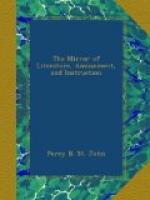Upon this assurance the king became more calm; he sat down, and Bradshaw proceeded:
“Gentlemen—it is well known that the prisoner at your bar has now been many times brought before this court to reply to a charge of treason, and other high crimes, exhibited against him in the name of the English people”——
“Not half the people,” exclaimed the same voice that had spoken on hearing the name of Fairfax, “where is the people?—where is its consent?—Oliver Cromwell is a traitor.”
The whole assembly seemed electrified!—all eyes turned towards the gallery: “Down with the w——s,” cried Axtell; “soldiers fire upon them!”—It was lady Fairfax. A general confusion now arose; the soldiers, though everywhere fierce and active, could with difficulty repress it. Order being at length a little restored, Bradshaw again insisted upon the king’s obstinate refusal to reply to the charge; upon the notoriety of the crimes imputed to him, and declared that the court, though unanimous in its sentence, had nevertheless consented to hear the prisoner’s defence, provided that he would cease to question its jurisdiction.
“I demand,” said the king, “to be heard in the painted chamber, by both Lords and Commons, upon a proposition which concerns the peace of the kingdom and the liberty of my subjects much more nearly than my own preservation.”
A violent tumult now spread throughout the court, and the whole assembly. Friends and enemies were all eager to divine for what purpose the king had demanded this conference with the two houses, and what it was his intention to propose to them.
Colonel Downs, a member of the court, expressed a wish that the king’s proposition should be heard.
“Since one of the members desires it,” said Bradshaw, gravely, “the court must retire;” and they immediately passed into a neighbouring hall. * * *
In about half an hour the court returned, and Bradshaw informed the king that his proposition was rejected.
Charles appeared to be subdued, and no longer insisted with any degree of vigour.
“If you have nothing to add,” said Bradshaw, “the court will proceed to give sentence.”
“I shall add nothing, sir,” said the king; “and only request that what I have said may be recorded.” Without replying to this, Bradshaw informed him that he was about to hear his sentence; but before he ordered it to be read, he addressed to the king a long discourse, as a solemn apology for the proceedings of parliament, enumerating all the evil deeds of the king, and imputing to him alone all the misfortunes of the civil war, since it was his tyranny that had made resistance as much a matter of duty as of necessity. The orator’s language was harsh and bitter, but grave, pious, free from insult, and stamped with profound conviction, though with a slight mixture of vindictive feeling. The king heard him without offering any interruption,




